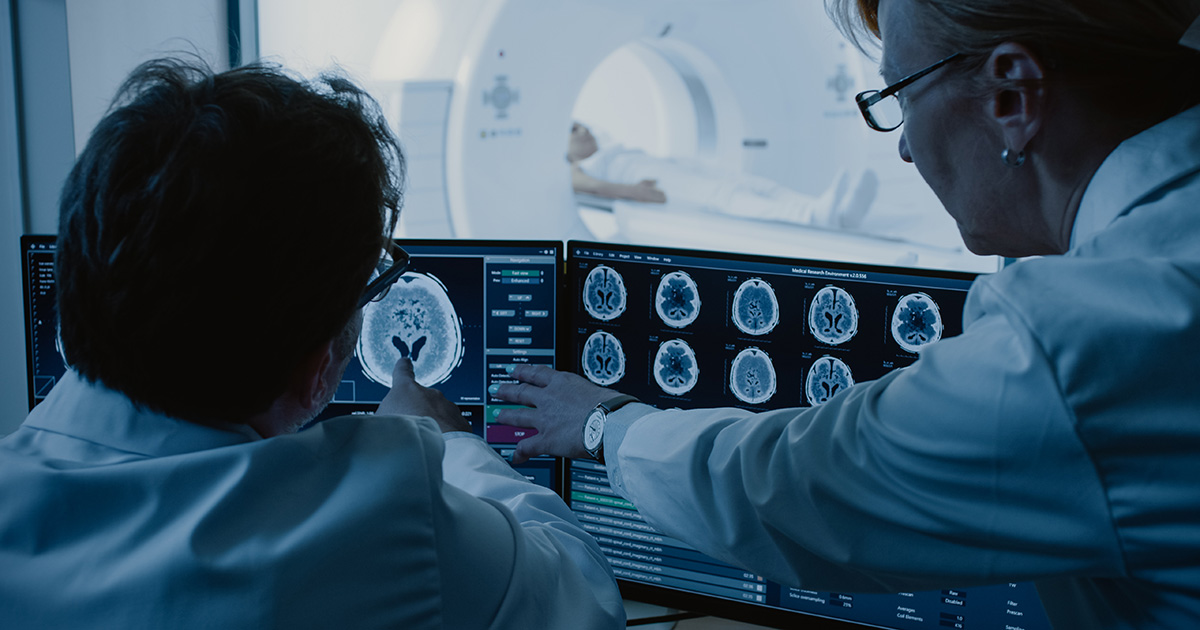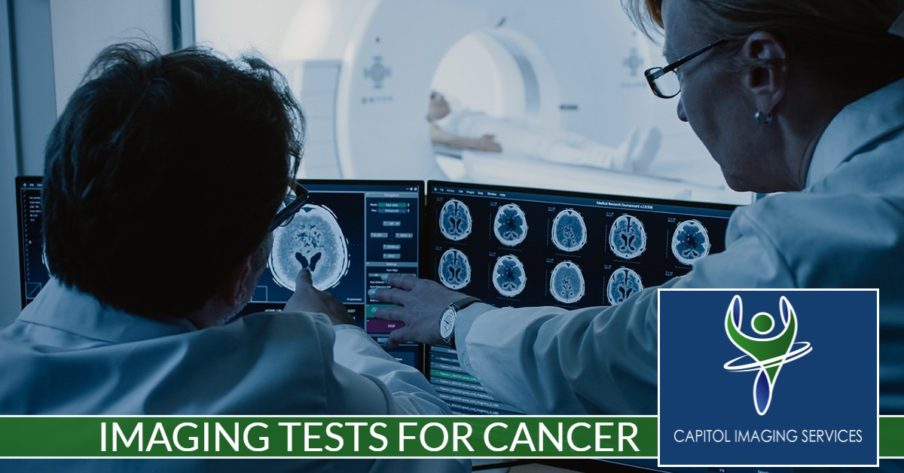Doctors use imaging tests to see inside a patient’s body and diagnose their illnesses and injuries. There are many different types of imaging tests, each with their own method of generating a photo of the inside of the human body. A doctor will often use a diagnostic imaging test to check patients for signs of cancer. Today we’ll talk about the types of imaging tests for cancer, many of which are offered by the experts at Capitol Imaging Services.
What are the Types of Imaging Tests for Cancer?
Depending on the diagnosis and severity of the patient’s condition, a physician may use a wide array of imaging tests to help determine the best cancer treatment. There are several types of imaging tests that physicians use to detect cancer in patients: X-Ray, Computed Tomography (CT), Magnetic Resonance Imaging (MRI), Ultrasound (US), Nuclear Medicine, and Positron Emission Tomography (PET). Here is a breakdown of how these methods of diagnostic imaging are used to detect and treat cancer:
X-Rays use electromagnetic waves to generate images of the inside of the body. X-Ray technology is frequently used to screen for the early stages of cancer, especially in women at risk of breast cancer. It is also used to determine the progression of existing cancerous masses. The experts at Capitol Imaging Services provide several X-Ray powered imaging tests, including: CT scans utilize both x-ray and computer technology to create three-dimensional images of the bones and organs. Physicians often consider CT to be the most appropriate method for detecting many different cancers, including lung, liver, kidney and pancreatic cancer. In addition to CT scans with and without contrast, Capitol Imaging Services also offers:
MRI systems use powerful magnets, radio waves, and computers to create high-fidelity models of organs and soft tissues. These scans are designed to detect small changes in tissues, making them especially effective in identifying the presence of cancer. Capitol Imaging Services also performs two highly-specialized MRI imaging tests:
Ultrasound technology utilizes sound waves to create an image of blood vessels and organs beneath the skin. This method of imaging is most frequently used to look for cancer in the abdomen as well as guiding a biopsy in breast tissue. Capitol Imaging Services offers a variety of ultrasound imaging tests, like:
Nuclear Medicine imaging scans utilize a small, harmless dose of a radioactive isotope to highlight parts of the body, making them easier to see in an imaging test. Some nuclear medicine tests that Capitol Imaging Services offer include:
When are Imaging Tests Ordered?
Physicians categorize the stages of cancer treatment into four parts– diagnosis, staging/restaging, response to therapy, and active surveillance. Imaging tests for cancer can be used during any of these stages to provide patients with optimal care throughout their treatment journey.

The diagnosis of cancer is often first detected through a diagnostic screening. A person may be screened for cancer whether or not they are experiencing symptoms. Cancer screenings aim to detect cancer before symptoms appear. This often involves blood, urine, and DNS tests, and medical imaging studies like mammograms, CT lung cancer screening scans and CT virtual colonography. These screenings are meant to provide early detection of cancer – the earlier the detection of disease, often the much better prognosis for successful treatment. If cancer is found, it is important to determine how much the cancer has spread. This is known as cancer staging. Imaging exams will assist in determining a cancer’s stage, and once known, doctors will determine the appropriate course of treatment and therapy. Diagnostic scans will also be an integral part of restaging cancer if cancer returns or spreads without ever having gone away. Imaging exams are often used to show a person’s response to treatment, to see if any cancer has been reduced in size, stayed the same, or grew. With this information, a doctor can determine whether a patient’s treatment plan is working for them, or if their plan needs to change.
Active surveillance involves regular diagnostic imaging scans to check if cancer has returned after treatment has been completed and remission has been achieved.
Are Imaging Tests for Cancer only Available at Hospitals?
Many doctors refer their patients to outpatient imaging centers rather than hospitals when they are in need of cancer testing. Hospitals are usually under a higher amount of patient demand, meaning that test results are more frequently delayed than at outpatient diagnostic centers. Patients may also find hospital environments more anxiety-inducing than a smaller imaging provider. The facilities at the Capitol Imaging Services Affiliate Network provide a calm, relaxed, and comfortable imaging exam experience.
Who Interprets the Test Results?
At Capitol Imaging Services, a board-certified radiologist is assigned to each imaging test for cancer we perform throughout our network. In certain instances, subspecialists will be involved in cases that require a specific interpretation radiology expertise. These specialists often have advanced fellowship training in thoracic, prostate, neurology or women’s health.
Our radiologists also consult closely with referring physicians on many cancer-related cases. Cases are usually time-sensitive. Capitol Imaging Services believes in reporting test results promptly - even calling the physician when necessary - so that treatment and therapy is not unnecessarily delayed.

Have Questions About Imaging Tests?
Has your physician recommended imaging tests to help diagnose and treat the progression of cancer? Capitol Imaging Services has a number of affiliate centers to provide you with the testing you need wherever is most convenient for you. CIS is accredited with the American College of Radiology and the Intersocietal Accreditation Commission, so you can rest assured that your examination will meet and exceed every standard of care. Contact us today to schedule your appointment at your nearest Capitol Imaging Services center. 



